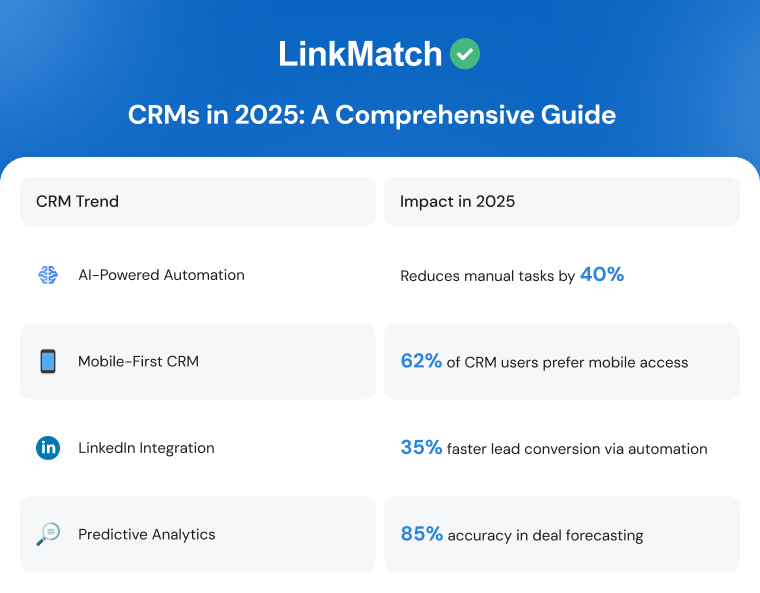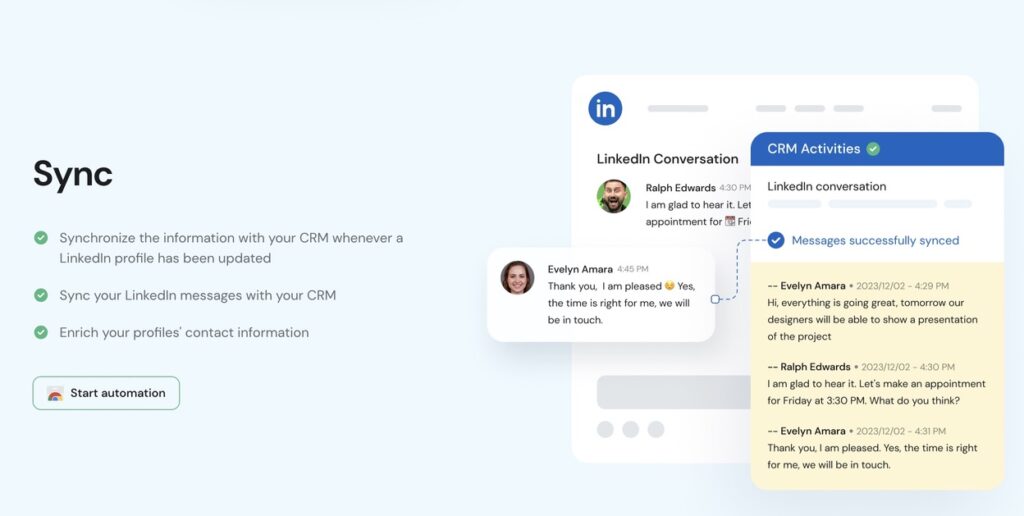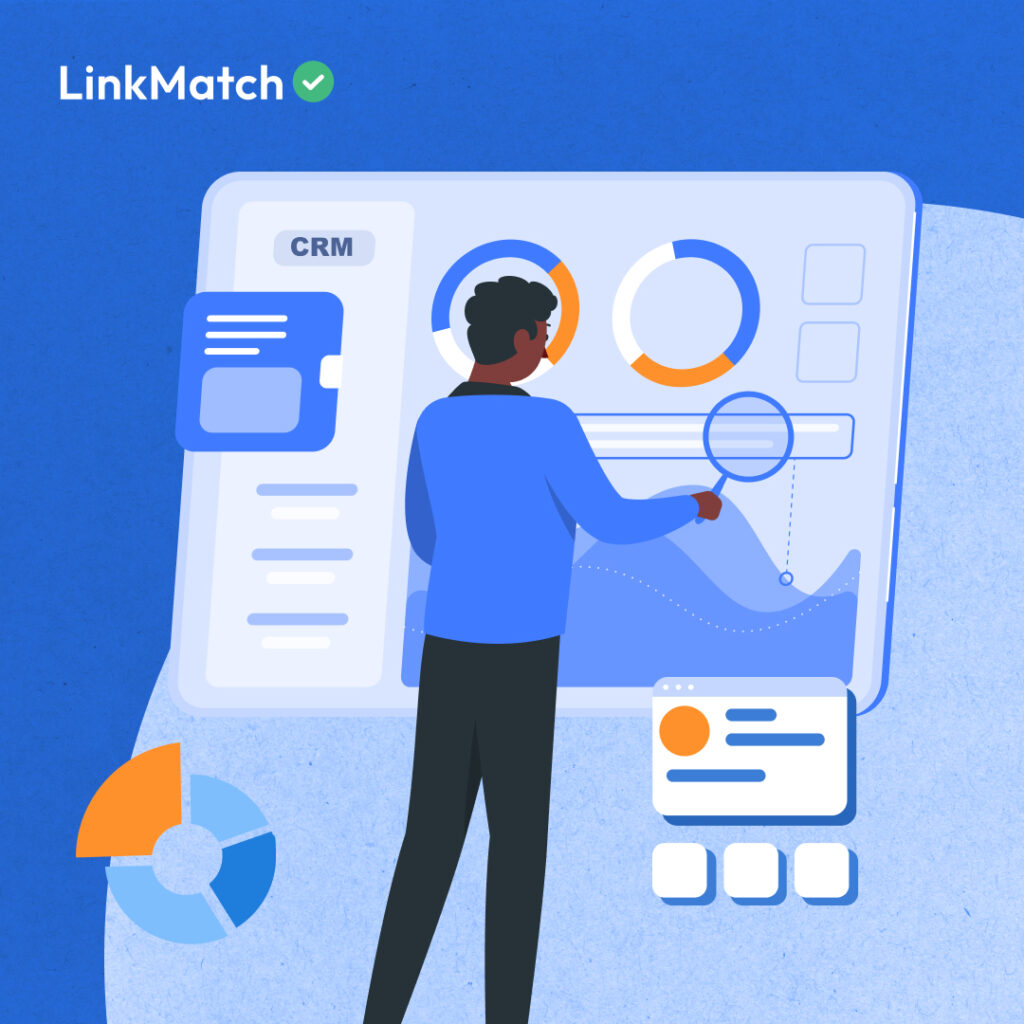Key Takeaways
- AI-driven automation is revolutionizing CRM and improving efficiency and predictive analytics.
- Mobile-first CRM is a game changer, enabling sales and recruitment teams to work seamlessly on the go.
- Integration ecosystems are essential, ensuring CRMs connect with LinkedIn, email, and other key tools.
In 2025, simply having a CRM isn’t enough—it’s about choosing the right one with AI-driven automation, deep integrations, and mobile-first capabilities.
Whether you’re in sales, recruitment, or customer success, your CRM is now the difference between winning and losing deals. Let’s explore how modern CRMs reshape industries and what you need to thrive in this AI-powered landscape.
CRM’s Impact on Modern Business
Without a CRM, businesses face fragmented data, poor customer insights, and missed opportunities. Studies show that 91% of companies with over 10 employees use a CRM, and businesses see an average revenue increase of 29% when using a CRM effectively. From streamlining sales pipelines to automating candidate sourcing, CRM platforms are mission-critical.
Additionally, CRM platforms enable businesses to respond faster to shifting customer behaviors. In a survey by Freshworks, 65% of companies reported that their CRM helped them adapt to market changes during uncertain economic periods. For midsize businesses, this flexibility becomes crucial when competing with both startups and enterprises.
Who Benefits from Modern CRM Solutions
- Sales teams: Automate follow-ups, track leads, and close deals faster.
- Recruiters: Integrate with LinkedIn, streamline hiring, and manage candidates efficiently.
- Customer service: Improve response times and customer satisfaction through centralized data.
Different business sizes use CRMs uniquely. Small businesses leverage affordable, all-in-one CRMs, while enterprises require AI-driven analytics and extensive integrations.
For midsize companies, the key advantage lies in balancing sophistication with simplicity. They need more than entry-level tools, but without the heavy lift of enterprise software. CRMs like Zoho, Close, and Insightly are increasingly targeting this mid-market segment with modular pricing, intuitive interfaces, and automation that fits lean teams.
The Evolution of CRM Technology: 2023-2025
Market Growth and Industry Leaders
The CRM market is projected to reach $163.16 billion by 2030, registering a CAGR of 14.6% from 2025 to 2030. Market leaders like Salesforce, HubSpot, and Zoho continue to dominate, while AI-powered challengers like Close CRM are gaining traction.
Interestingly, we’re seeing rapid innovation from smaller CRM vendors building niche functionality around AI, industry-specific workflows, and faster onboarding. These disruptors draw midsize companies looking for agile solutions with short learning curves.
Game-Changing Features Introduced

- AI-driven sales forecasting: Platforms like HubSpot and Insightly now provide real-time predictive analytics.
- Automated LinkedIn prospecting: LinkMatch, our Chrome extension, integrates LinkedIn profiles with HubSpot, Zoho, Greenhouse, and other CRM, reducing manual data entry.
- Voice and SMS automation: Close CRM now offers built-in power and predictive dialers, increasing call efficiency by 60%
Other innovations include adaptive workflows that evolve based on rep performance, and AI-generated insights into buyer sentiment using email analysis and call transcription tools. These additions are transforming CRMs from static systems into dynamic team players.
Measuring Business Impact
Implementing a Customer Relationship Management (CRM) system can significantly enhance a company’s performance across various metrics.
For instance, a U.S.-based CRM provider achieved a 226% ROI by implementing HiBob, with a payback period of just six months.
CRM systems streamline operations, leading to notable productivity gains. Key performance indicators (KPIs) to monitor include:
- Sales Cycle Duration: Reducing the time to close deals indicates increased efficiency.
- Lead Conversion Rate: An increase in the percentage of leads converted to customers reflects improved sales effectiveness.
- Customer Retention Rate: Higher retention rates suggest better customer satisfaction and loyalty.
Companies are reporting significant efficiency improvements after implementing CRM. For instance, Wells Fargo enhanced customer service by leveraging CRM for social media connectivity, ensuring prompt and effective client communication.
MBNA Europe experienced 75% annual profit growth by investing in CRM to screen potential cardholders better and retain profitable customers. This strategic approach led to a 97% retention rate among its most profitable clients.
Implementing personalized greetings and collaborative filtering through Amazon CRM systems resulted in 80% of customers repeating purchases, showcasing the effectiveness of tailored customer interactions.
Beyond individual KPIs, businesses are also seeing improved cross-departmental visibility. When sales, marketing, and support teams operate from a shared CRM database, they avoid duplicated outreach, align around customer goals, and create a seamless buyer experience.
Essential CRM Features Driving Business Growth
Modern Must-Have Capabilities
- AI-driven leads scoring for better prospect prioritization.
- Multi-channel automation, including email, SMS, and LinkedIn outreach.
- Robust reporting dashboards to track pipeline performance.
Integration Ecosystem and API Support
A fragmented workflow is one of the biggest pain points for sales and recruitment teams. Manually copying data from LinkedIn to a CRM, switching between multiple platforms, and dealing with outdated or incomplete contact records can slow down operations and lead to missed opportunities.
Sales reps waste an average of 5.5 hours per week on manual data entry, while recruiters struggle with disjointed candidate profiles, leading to inefficiencies in sourcing and follow-ups.
This is where seamless CRM integration comes into play. A robust integration ecosystem ensures that LinkedIn or Xing, email, and CRM data sync in real time, reducing manual workload and improving data accuracy. For instance, integrating LinkedIn with Sales CRMs can boost your sales strategy.
LinkMatch is a powerful tool that addresses these challenges by integrating LinkedIn or Xing with multiple CRMs and ATS platforms, including—but not limited to—HubSpot, Zoho CRM, Greenhouse, Pipedrive, Insightly, Close, PCRecruiter, CATS, and Copper.
With one-click profile saving and real-time updates, LinkMatch allows professionals to instantly transfer LinkedIn profiles into their CRM without switching tabs, ensuring data consistency and accuracy across platforms.

Unlike many browser extensions, LinkMatch offers real-time syncing, customizable field mapping, and ATS support, making it one of the few tools tailored for both sales and recruitment professionals.
Mobile-First CRM: Working From Anywhere
With 62% of CRM users accessing data via mobile, top platforms now provide:
- AI-powered mobile assistants for on-the-go insights.
- Offline functionality for sales teams working remotely.
- Integrated messaging with WhatsApp and SMS.
Looking Ahead: CRM Innovation in 2025
Emerging Technologies Shaping the Future
The future of CRM isn’t just about storing data—it’s about intelligent automation, immersive experiences, and bulletproof security. Here’s how cutting-edge tech is set to transform the way businesses interact with customers and candidates:
AI-Powered Virtual Sales Assistants
Imagine a CRM that doesn’t just store contact details but acts like your personal assistant—automating follow-ups, crafting personalized emails, and even predicting the best time to reach out. AI-driven sales assistants will handle routine interactions, allowing sales teams to focus on closing deals instead of chasing cold leads.
Augmented Reality (AR) for Customer Engagement
Boring product demos will be obsolete. AR-powered CRMs will enable sales reps to give live, interactive demonstrations, allowing prospects to visualize products in their own space before purchasing. Think about real estate tours without leaving your desk or trying out office furniture through a smartphone screen.
Blockchain-Based CRMs for Data Security
With data privacy concerns at an all-time high, blockchain technology is stepping in to ensure tamper-proof, fully transparent customer records. Businesses can track every customer interaction securely, making fraud, data leaks, and unauthorized changes nearly impossible.
The CRM landscape in 2025 will be more intelligent, automated, and integrated than ever. Sales and recruitment professionals who embrace AI, automation, and mobile-first solutions will gain a competitive edge. Tools like LinkMatch, which bridges LinkedIn with CRMs, further enhance efficiency.
Ready to Unlock Your Full Potential?
Start Your Free Trial
FAQs: CRMs in 2025: A Comprehensive Guide
What are the biggest CRM trends for 2025?
AI-driven automation, mobile-first solutions, and predictive analytics are the key trends transforming CRMs in 2025.
How does LinkMatch improve CRM efficiency?
LinkMatch integrates LinkedIn or Xing with CRMs like HubSpot, Zoho, and Greenhouse, automating data entry and contact syncing.
What is the best CRM for small businesses?
HubSpot and Zoho CRM offer affordable, user-friendly solutions, while Close CRM is ideal for sales-driven teams.
How does AI impact sales and recruitment?
AI improves lead scoring, automates workflows, and enhances candidate matching, reducing hiring time and boosting sales conversions.
What’s the future of CRM integrations?
APIs will continue to expand, allowing seamless integrations with LinkedIn, WhatsApp, and AI chatbot integrations for enhanced customer and candidate engagement.


